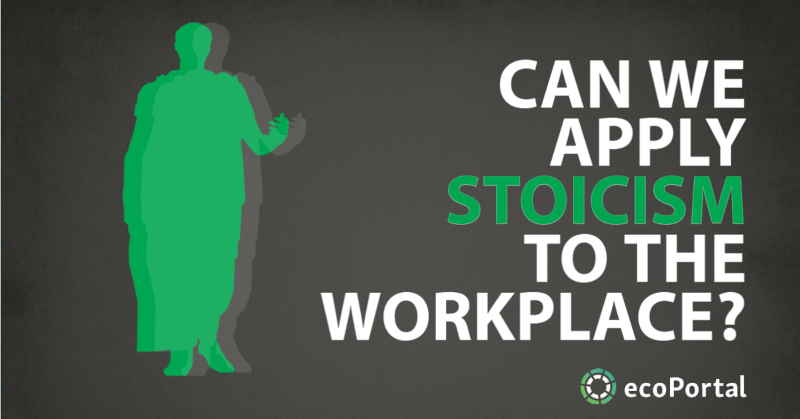Stoicism - an ancient philosophical practice developed by great minds such as Socrates, Plato, Epictetus, Seneca, Marcus Aurelius and more - is used and credited by many of today’s leaders.
The word ‘stoic’ usually conjures images of an emotionless persona, devoid of joy. However, the English adjective has deviated from the original meaning behind the philosophy.
Stoicism is really just a practical life philosophy, focused on curating and maintaining inner peace through the central idea: that the path to happiness can be found through living in the present moment, avoiding succumbing to either desire for pleasure, or fear of pain, and treating others fairly and justly.
The Stoics believe that one can achieve this by living a life of virtue; especially upholding four cornerstone virtuous principles in life - practical wisdom, temperance, courage, and justice.
They also have a strong belief in the idea of operating within our locus of control. We can only control what we can only control - and therefore there’s no point giving attention to external influences in your life that you have no control over.
What’s really fascinating about Stoicism is that the philosophy is a poignant reminder that even 2000 years ago, humans had the same stresses and life problems, and the philosophers sought answers to the same questions we face today.
So how can we apply stoicism to the modern-day workplace?
There are several areas where the essence of the philosophy can really come in handy. Unlike Plato, we do not need to succumb to a life of poverty to embrace suffering and pain, but we can still use some of the principles to reduce stress, increase motivation and improve our wellbeing.
Get fresh H&S insights weekly
Don’t Sweat The Small Stuff
Stoics love the idea of not making life more difficult than it has to be. They ultimately believed that stress is inherently a perception and therefore, subjective. Stress, the Stoics intuitively realised, was not the product of multiple external events conspiring against you, but rather the perception of your life and anticipation of the future.
Even if you’re finding a colleague particularly abrasive one day, the Stoics advise you not to sink to their level and respond to things in anger or stress. It makes sense. Responding in anger or frustration to simple requests only escalates a situation and causes a greater disparity between people.
Have some deadlines looming? When you’re next feeling overwhelmed with your workload, remember that stress only exists in the future. Channel your inner Stoic, and try to adjust your perception of what you have to do. Simplify your tasks, and make your day as seamless as possible.
Keep Things Simple And Focus On the Task At Hand
The Ancient Greeks and Romans might shudder at the state of our world today. More than ever, we’re struggling with distraction (thanks, Instagram feed) and our attention spans are shrinking at an alarming rate.
What would a Stoic have to say about this?
Likely that a large part of stoicism is steady discipline, making sure you finish the task at hand without distraction or a half-hearted effort. Indeed, our days give us plenty of moments to distract us or invite overthinking.
Instead, the Stoics remind us to slow, do one thing at a time - and to do it well.
Marcus Aurelius went on to note the clarity that arises from the simplicity of doing one task. Even something as small as brushing your teeth (yes, for the full recommended two minutes) is an invitation to try this out. Simply become focused on your task and find the clarity that comes when you do so.
When you apply this to your workdays (closing that email tab, staying off the workplace chat at every moment of the day), you begin to improve your efficiency and productivity.
Stop For A Moment And Take A Walk
"We should take wandering outdoor walks, so that the mind might be nourished and refreshed by the open air and deep breathing.” — Seneca
Break up your day and go for a wander outside the office for even just five minutes. The Stoics believed in the power of a good walk, allowing your mind to notice the outside world, and giving your body some much-needed fresh air.
Certainly, short walks throughout your day are beneficial. Getting your body up and out of the office chair, and moving around helps to increase blood circulation and get your brain fired up. Scheduling a brief walk in the afternoon, around the classic 3 pm slump is another good way to shake off the sleep and squeeze in some productive hard work before the end of the day.
If you’re tightly packed during your day, try introducing walking meetings. Instead of having a chat with your colleagues sitting down in a different chair in a different room, opt for a short walk around the block instead.
Find A Time To Journal
The Stoics were firm believers in the power of self-expression through writing in a journal. Journaling provides a useful opportunity to reflect on your day and all your experiences, and narrow down your thoughts into clear sentences.
Journals can offer comfort and support. Writing down your innermost thoughts privately helps you understand your own problems, and create an important sense of self-awareness. Instead of ruminating on any particularly worrisome thoughts, journaling is a practical way to put pen to paper and list them out.
Many of the world’s greatest thinkers have cited journaling as a key self-development tool in their lives. From Ben Franklin and Henry David Thoreau, to Barack Obama, many of the leaders we admire abide by the art of self-reflection. Meditations, by Marcus Aurelius, is one of the most influential books in the school of stoicism, and originally was written as a private journal.
There is no right or wrong way to journal. As a private form of self-expression, journaling requires no particular skill - rather, just a commitment for a while to get your thoughts out. Committing to daily journaling can help you clarify your ideas, increase your creativity, and free your mind of excess distractions that divert your attention away from your work.
Final Words
These are just a few of the useful ideas influenced by the ancient philosophy of stoicism that we can incorporate into the modern-day workplace.
Despite many, many, many years between us and these ancient philosophers, their wisdom certainly still rings true, and can help shape you into being your best self - through deeper focus in the present and the wisdom to concern yourself only with what you can control in your life.



.png?width=352&name=Copy%20of%20RETAIL%20SAFETY%20(2).png)

.jpg?width=352&name=AI%20health%20and%20safety-1%20(1).jpg)


